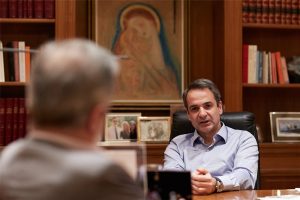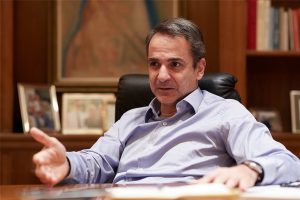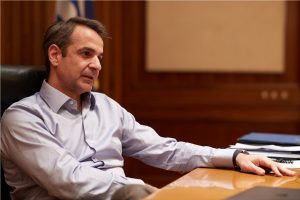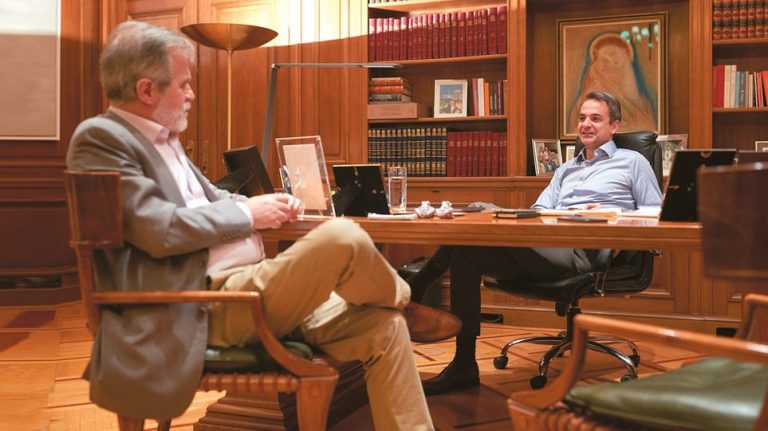Entering these days at the Greek Prime Minister’s residence the first noticeable difference seen compared with the past is the antiseptic bottles everywhere in accordance with the personal hygiene rules. The coronavirus pandemic makes no exception and Kyriakos Mitsotakis seems to have fully realized it. “The hardships are ahead of us. And we have an obligation to warn the public that the next month will be very difficult”, he told Proto Thema, as he welcomed us to the Prime Minister’s office with handshakes, as the rules now restrict the spread of the virus.
Interview by Grigoris Tziavaras
“There is no doubt that we will have an increase in cases, we will have an increase in serious cases, people will lose their lives, we should be aware of that”, he tells us. “The important thing is to keep the number to a minimum and not lose the lives of people who might have been saved – there is the great effort. This is our main concern”. He speaks calmly and slowly. Counts every word that comes out of his mouth. He seems cool, though he told us that his friends told him that he seemed tired in a televised message to citizens on Wednesday. He doesn’t deny it, but he doesn’t care.
“The question all the time is how I will make the decisions that I make on a daily basis, putting all the data I have in my brain’s computer, but with confidence and my intuition too”, the Prime Minister tells us. He explains that he had the intuition that we should go faster. “And I still have it”, he adds. “That is why we will take further measures. I see the problem. I see what’s happening elsewhere. I won’t wait for the crisis to erupt. Because three, four or five days a week can make a difference in the way we will go”.
“I’ve read too much to know for myself about the nature of illness”, he reveals in the course of the discussion. “I read studies and analyses, I’ve become an amateur epidemiologist”, he laughs. “Because I need to know in order to ask the right questions. I don’t expect and don’t demand to have the answers, but I need to know the questions I need to ask. And let those who advise me know and not beautify the situation, because there is often such a tendency. So, my job is to ask the right questions and then judge whether the answers are adequate or not”.
We begin our conversation by pointing out that what we are experiencing at this time is characterized by the term “perfect storm” derived from Meteorology. “I don’t like the analogy”, the Prime Minister replies. “It reminds me of the movie” ‘Perfect Storm’ in which the main character, George Clooney, ended up drowning with his entire crew”.
So how does he experience it himself? “What I can tell you is that I certainly did not imagine when I took over as Prime Minister -with the first priority then being the economy and the public order- that we would suddenly find ourselves facing two very important crises at the same time: a refugee crisis fueled by Turkey and at the same time a huge global public health crisis, which seems to take on dimensions that are unpredictable and will certainly have a significant impact on the economy”.
When did the government realize the extent the issue of coronavirus could take? “Once there was an active spread of the problem outside China, it was very clear to us – our experts were saying – that sooner or later it would arrive in Greece. As it would in all countries”.“We knew it was a pandemic long before it was officially announced by the World Health Organization”, the Prime Minister explains, “and so we rushed to take action far ahead of many other European countries so that we could do what we all want to do currently”. What is it we want? “To save time so as not to disproportionately burden our health system with many cases that will fall on our hospitals and make it difficult to respond”.

“The big problem with this disease is not the 80% or 85% that will get through it without even understanding it”, he says. “It is the vulnerable, those with chronic illnesses, the elderly who may need hospital care or may need access to the Intensive Care Units and some respiratory support”.
“We don’t want these events to fall together”, he tells us. “And that’s why I speak so strongly about the concept of individual responsibility. Because we can get sick with no personal consequences, but if we transmit it to a person who is old or if we allow with our behavior to spread the virus more quickly, the consequences for another person, whom we may not even know, can be dramatic”.
Our conversation goes to Italy and the dangers of losing the game like our neighbors. “What I can say is that we will do whatever it takes to prevent that from happening”, he tells us, but he does not hide his concern that the virus’s rate of maturation cannot be predicted with mathematical certainty. “If we all do what we need to do, we will not become Italy”, he assures. However, he is quick to point out that “this is something that goes far beyond the capabilities of a Prime Minister, a state or a health system”.
He takes the opportunity to draw us a picture of the situation as it was discribed to him by a friend of his in Chania, where cafes were still very crowded. “That’s wrong. It’s a problem”, he tells us in a sharper voice. “Older people need to restrict their movements themselves”, he says.
“I make another call through your newspaper to sit at home as much as possible and isolated themselves because they are the most vulnerable and those who may need hospital care”, he continues. Risks will be reduced “if we all do what we need to do, adhere to personal hygiene measures and limit our social interactions if we do what is called ‘social distancing’ in English”.
“No state can control the problem to the fullest extent”, he tells us. “What the state can do -and what we have done- is to gradually take more and more steps to limit social gatherings. This is what we did, what we do and what we will continue doing”, he notes.
“We are well aware that this will have a significant economic impact, but this is not our main priority right now. Our first priority is the protection of human life”, he said. And it states that it is ready to take any measure required in a timely manner and without delay.
When the debate gets more personal, we note that they did not had a handshake with Angela Merkel in Berlin, but in the corridors of the German-German Forum, many people approached him to take selfies with him. “It got me very concerned”, he tells us. “But I told myself I couldn’t get myself into a crystal bowl. I will continue to work, I cannot stop communicating with the world, I try to do it as needed and where it is possible by teleworking”.
Did he think he could be affected too? “I may have the virus myself and not know it. At present I have no symptoms, so I have no reason to be examined. If I had a symptom, I would be. I know that I may be quite exposed right now because I have too many contacts. But I also have a job to do and I have to do it”.
To the reasonable question if he is personally concerned, his answer is no. “I’m not young anymore, I’m middle-aged, but in good shape”, he continues, laughing. “I obviously have a responsibility to protect myself, but on the other hand I can’t stop working”.
So, he does what he did before? No. “I limit my public appearances, as we all do. I must give the example. I have to tell you that video conferencing have increased a lot lately. I’m not going to stop working, I’m not going to stop having meetings. But everything is adapted to the needs of the time. Nor can I control everyone I associate with whether or not they have the coronavirus or not. So it’s a risk I take”.Are they taking action at home? “Mareva is after me. I tell her, ‘In the end you will get me the virus with everything you do’ “, he replies laughing. “But I honestly do what I have to do”, he adds. And the children of the family who are abroad? “My son is coming back because his university was shut down in America and he is also going into e-learning. My daughter is in London and she works. They still have no such restrictions, but I see it coming…”.

“It’s an opportunity to get together and spend more time at home”, he adds. “And I think that’s the advice I can give: more time at home, less time outdoors, small meetings. These are the same things I said in the message to young people: If it is to exercise, it is better to exercise outside. Go for a run or ride a bike, which takes you outdoors. And of course, take a lot of care of the elderly”.
The Prime Minister comments strongly and sympathetically on the attitude of the Church. “I spoke openly”, he tells us, and when we ask him why we should expect his own position, and not his associates’ on the issue that has arisen about church, he is categorical: “It is a matter that should go primarily to the Prime Minister”. And he adds: “Look, we were in a dialogue with the Church and I understand the theological dimension of the matter. I understand. For two thousand years now this issue has not been resolved and it will not be resolved within a week…”.
“But I’m waiting for the cooperation of the Church,” he to tell us. “And I’ll be very honest. We must limit mass attendance in churches. I believe that everyone has the right. And I have it. At one time I went to church alone, lit a candle, made the sign of the cross, and said what I had to say to myself. The problem is the mass attendance in churches. And that is why I want the cooperation and assistance of the Church so that, as far as possible, we will have a separation there”.
In pointing out that some hierarchs seemed comparatively more open-minded than others, the Prime Minister did not want to make a distinction: “I do not demand, you know, that the Church always moves at the pace that the State is moving. But I think the exhortations have been made and I believe that if you look at it from a believer’s point of view it will not be considered a sin if it does not attend the Greetings or if it does not go to church on Sunday. They can go sometime in the week to light a candle”.
“The mass gatherings we want to avoid and especially the mass gatherings of people who by definition are vulnerable. Because the truth is that the Church’s flock is primarily elderly people – and we must bear that in mind. So, as Prime Minister, I have to warn them of this danger and tell them that what applies to gatherings obviously applies to churches as well, “the Prime Minister adds.
Our debate could not help but go to the response to the state mechanism, for which the Prime Minister does not hide his satisfaction. “We have always heard people in Greece ask ‘where is the State?’ Well, we haven’t heard that these days. And I think it’s good, because the State is all of us. Especially in such a crisis there is no State. There are structures and people who do their job. And I have to tell you that too many people have exceeded their limits in managing both the migration crisis and managing this health crisis without knowing the problem. The hardest thing in these crises is that you work too much and you never know when it will end”.
“The State worked better than many expected”, Mr Mitsotakis points out. “And EODY worked well with Civil Protection. We have been constantly updated and we have spoken to the people with complete transparency and we have made difficult decisions earlier than many other European countries precisely to limit a rapid outbreak”.
“I have great confidence in the public health system, although it has been suffering and underfunded for many years now…” he adds. And when we interrupt him to ask if this is an implication to the previous government, his answer is immediate: “No, no, not at all. It’s a chronic problem. Nevertheless, I believe it will stand up to the circumstances. We have excellent and very dedicated doctors and nurses”.
Museums and archaeological sites closed until March 30
Coronavirus: Watch the disease spread in real time (interactive map)
The Prime Minister believes that the current crisis is also an opportunity to correct “some of our shortcomings”. As he tells us, “we will get people through very fast procedures, bypassing procedures to hire nurses and doctors with 24-month contracts to continue providing services to the health system after this crisis has passed…”.
In this context, Mr. Mitsotakis invites all interested parties to enter the platform so that they can start their work very quickly. “What I am interested in right now – I have no time and no tolerance, I want to make it clear – is not to delay due any bureaucratic hurdles. We do not lose and we cannot lose a single day”.

In addition to protecting public health, the Prime Minister also considers the protection of the economy, workers and businesses to be crucial. “When a state decision closes a theater, so it has no opportunity to make money or pay its employees, the State must intervene”, he explains.
How is this going to happen? Will it give money and to whom? “It will give the employee money, of course, there is no other way. At the same time, the state will allow parents to obtain permits so that they can take care of children under the age of 15”. In addition, “the State will intervene with a number of measures to stimulate business liquidity”.
New measures next to the suspension of tax liabilities will be added very soon “and more, even more drastically, to keep businesses alive, not to have large job losses because there will be a significant downturn in overall economic activity. We will also do whatever is needed on this front”, the Prime Minister said.
“I was the first to raise the issue in Europe that there should be exceptions to the Stability Pact that would allow us -quite simply- to have a bigger deficit this year or a smaller surplus”, he explains. He notes that at European level “there is a sense of urgency”, but our country will not be left with its arms crossed waiting for European coordination.
The government, as the Prime Minister explains to us, has its own proposals, which have already been sent in writing to the Eurogroup. They provide, inter alia, that ‘measures relating, for example, to the non-rigorous interpretation of State aid issues. How can we support specific businesses without breaking European competition rules? “We will also seek to ‘use the resources of the ESPA extensively to support a number of employment-related actions”.
The Prime Minister also considers the support of tourism, which he is optimistic about, however. To our question whether we will have tourists in the summer, his answer comes without hesitation. “I believe we will have”, he tells us. “The fact that the crisis has happened now is not the absolute catastrophe for us, because I want to hope it will turn around and at some point everyone will understand that the crisis has passed and they will want to come”.
Nevertheless, the government intervened in the matter of protecting the tourism industry. “One of the first things we did was, speaking with the tourism industry, to postpone all policies for booking cancellation in the future. In other words, to give the world the opportunity not to postpone his bookings for later because he feels the pressure to make a decision right away. He will be able to do so later”, he said.
The Prime Minister does not hide that, whatever the economic impact will be, it will be significant. “We are here, however, to give financial support”, he says. He hopes, however, that “as always in these cases, when the crisis is over, the recovery will be faster”. Describing the situation, he notes that “it’s like we’ve hit a pause right now. As if time has stopped. Time will certainly start again in economic activity and we must be ready”.
He even assures that “no matter how strange it sounds, we are preparing for the moment when the crisis is over”. For example, the tourism campaign was suspended. “We’re pausing our campaign so we can drop our money on it when they will make a difference. Now it doesn’t matter, we would be a waste of money. Who’s thinking about his vacation right now? Nobody. And certainly not us”.
Broadly speaking, the Prime Minister insists that, despite the double crisis his government faces, “there are important reforms that must not be left behind”. He underlines that “especially now that we are facing an economic crisis, a series of changes should be accelerated. Some things may go backwards, but there are some that need to go faster”.

The guarding of the border in the Evros is a policy that will continue, underlines Kyriakos Mitsotakis when our discussion goes to the ongoing Evros crisis, for which the Prime Minister is obliged to devote time to. “Now I am more concerned with the coronavirus, as I think now the issues in Evros are in order”.
As he explains to us, there was a very intense period of Clean Monday Weekend. “We stayed awake for a long time to be absolutely sure that we were operationally ready to support a political decision I had already made. That is, I did not process it, it did not concern me, I was absolutely determined, I was never going to allow an irregular and unauthorized entry of refugees-migrants under the conditions that Turkey wanted”.
“The issue was not the decision, but its implementation. The cooperation of all the responsible, the operational strengthening of our forces, the very good cooperation between the Police, the Army, the Coast Guard and the National Intelligence Service so that there is common information and complete coordination of operational actions”.
Bulgaria opens dam in Evros – Water level rises closing passage for illegal immigrants
Particular attention was given to informing the public and especially to informing foreign leaders “so that we can obtain their full support very quickly, which we have had from both the Member States and the European institutions”.
Kyriakos Mitsotakis considers it a “great conquest for our country” the fact that “for the first time Greece has secured the right to guard its borders because they are Europe’s borders. And Greece has proven that it can do it operationally”. As she explains, “it’s not just a matter of intention to say ‘I protect my borders’, the point is how you do it practically. We have proved this and I think it is a great achievement for Greece”.
He believes the measures are in line with what his government has pledged. “We said it from the beginning, but there was a question about our policy. Because people didn’t necessarily believe that what we were saying could be done. Because a lot of things were complicated. Many wanted time to materialize, changes in asylum procedures, the launch of new controlled detention centers. But the most important thing that people didn’t believe was that we would guard our borders. “You can’t protect them”, they told us. So we have proven in a crisis that we can protect them and that the great majority of society demands it because it is self-evident. That is, we did not do something that was unpredictable, or out of common sense. We did what was obvious”.
“I got into a situation where the Evros borderline were practically open”, the Prime Minister tells us. But boosting its protection “is not a current issue, it is a project we have been working on for three or four months”. It even assures that this will be a ‘permanent situation’ from now on. What does this mean; “It means investing in infrastructure, more fences, more surveillance, cameras, drones. The same would apply at sea with the Unified Integrated Maritime Surveillance System, which should have been launched years ago, and we found this in the drawers”.
Ask me anything
Explore related questions





